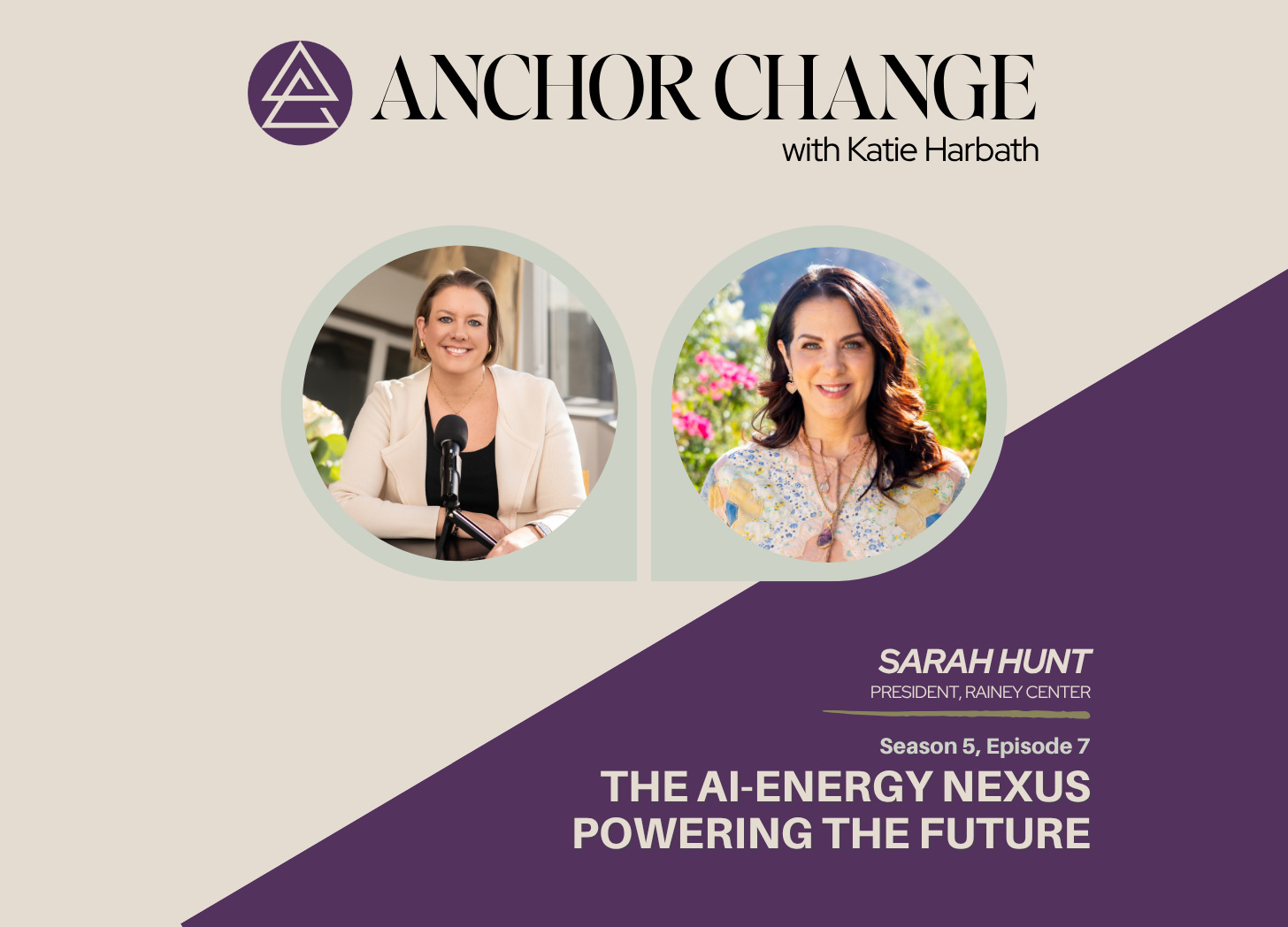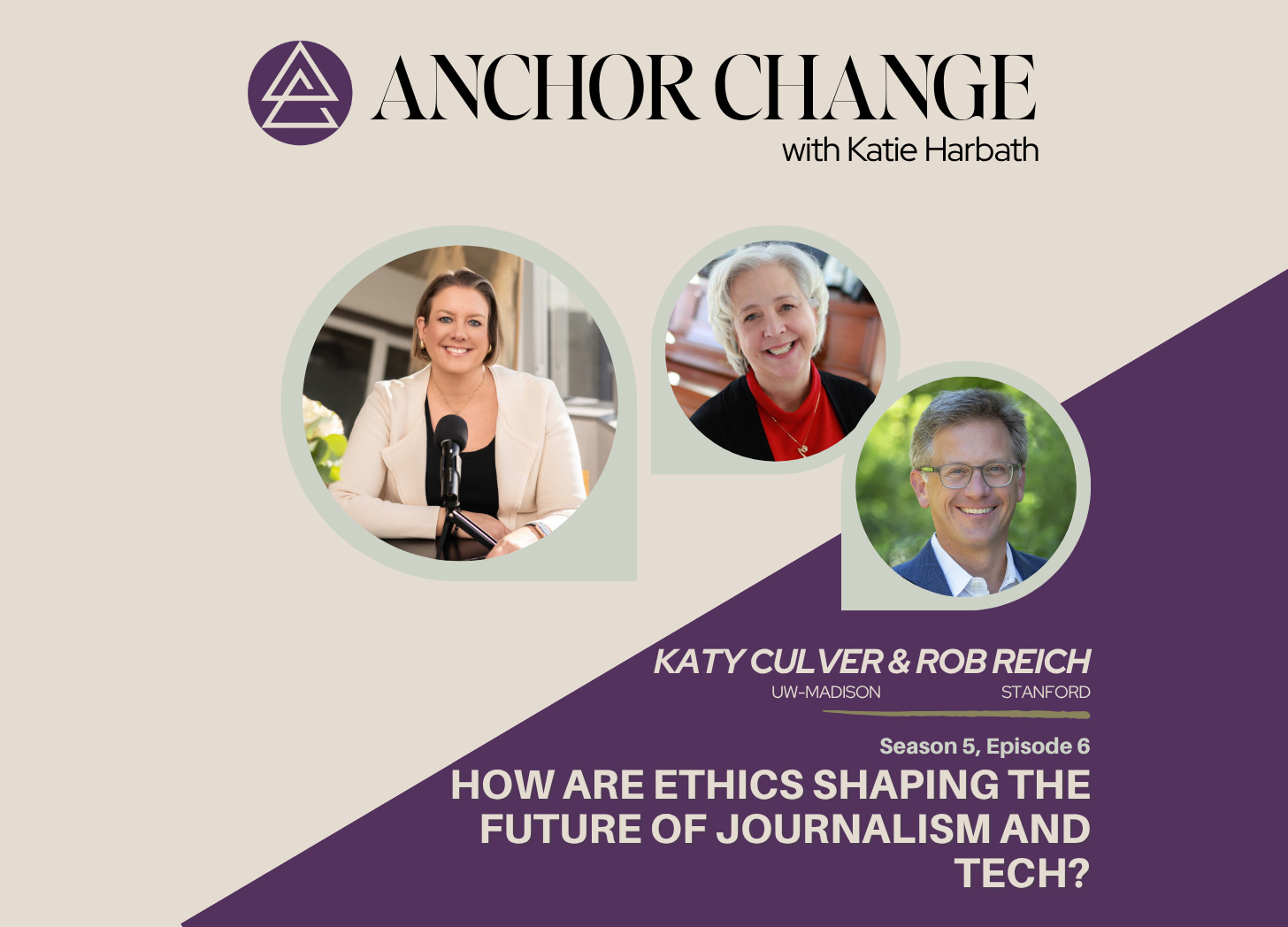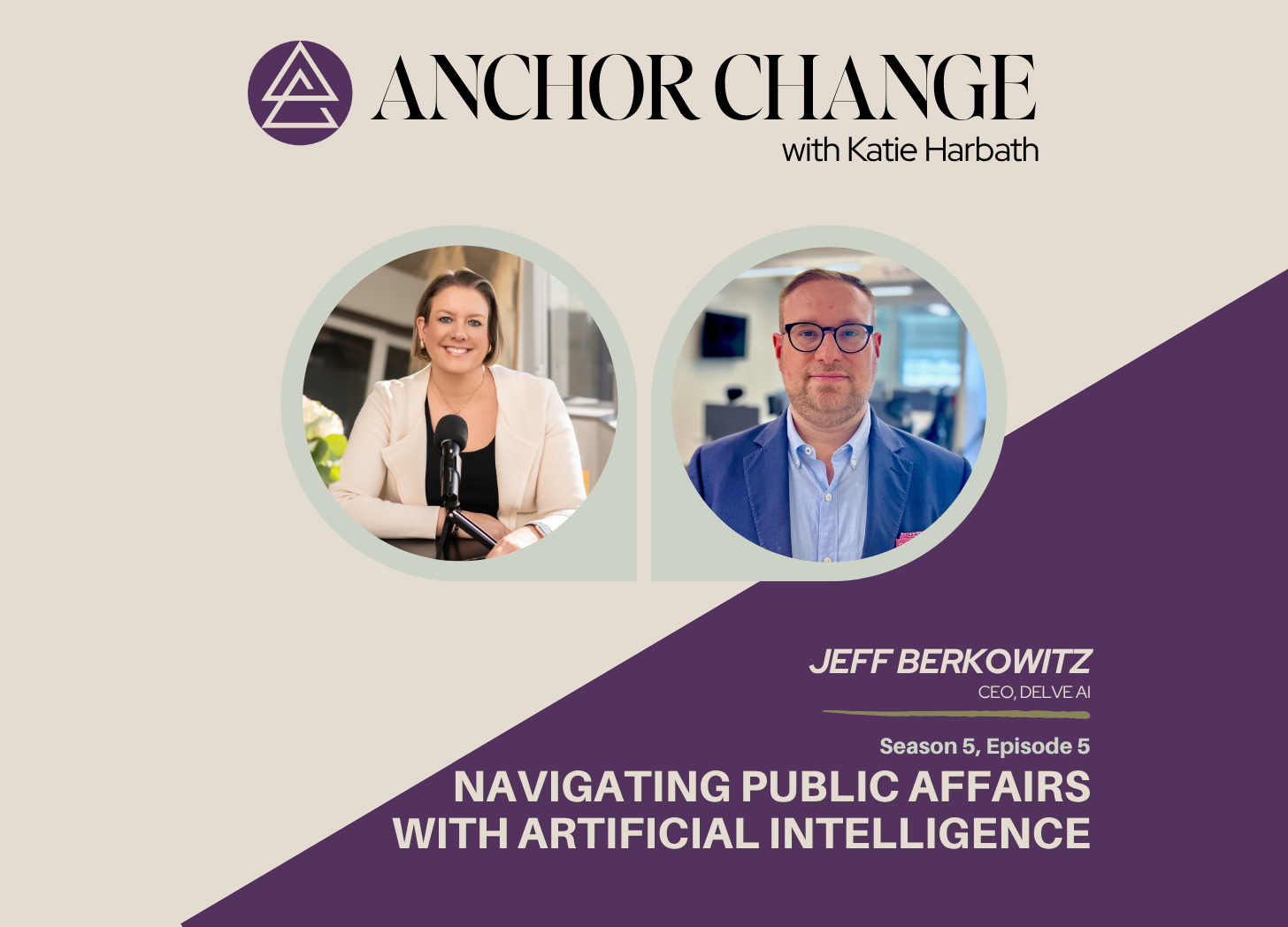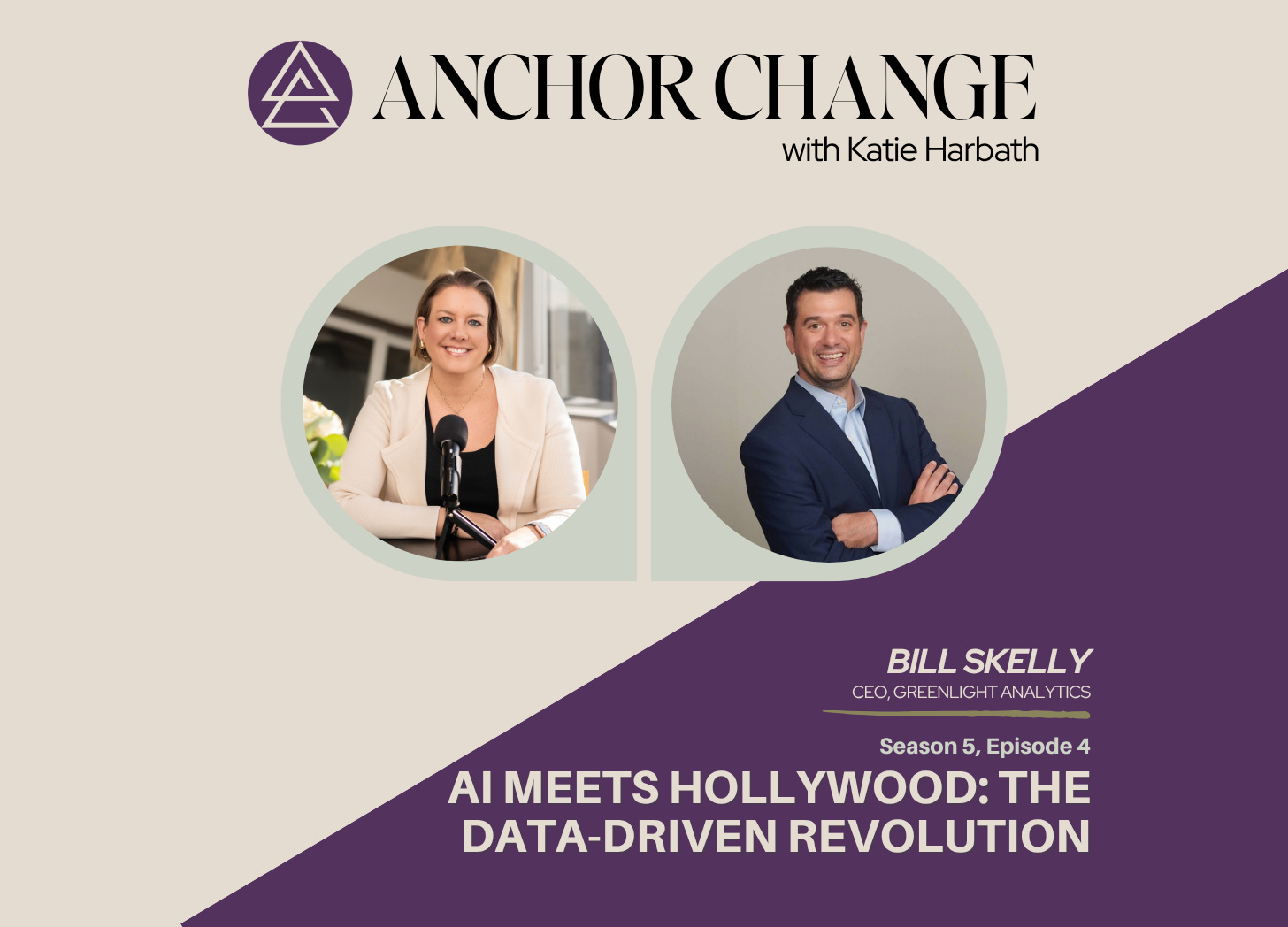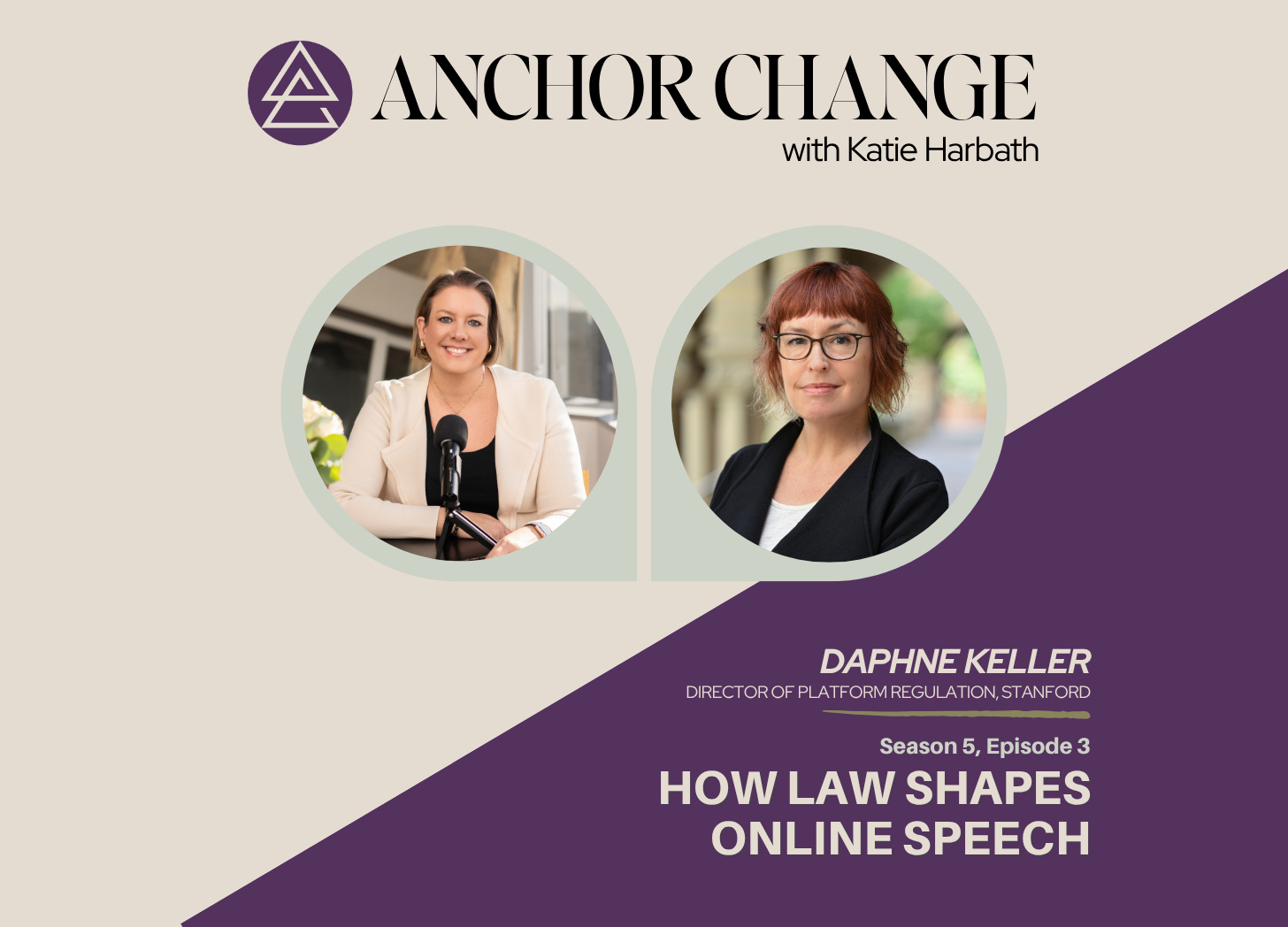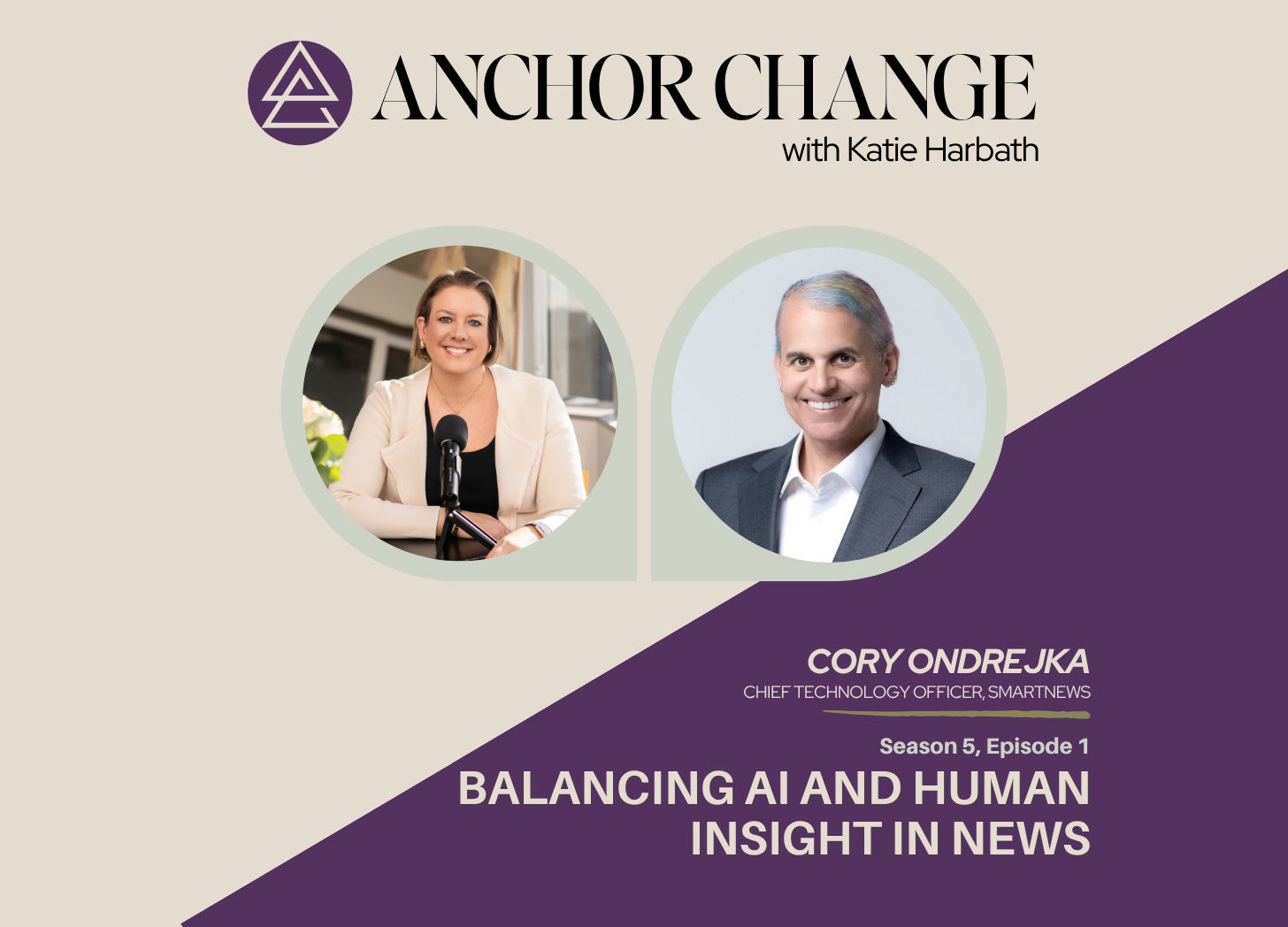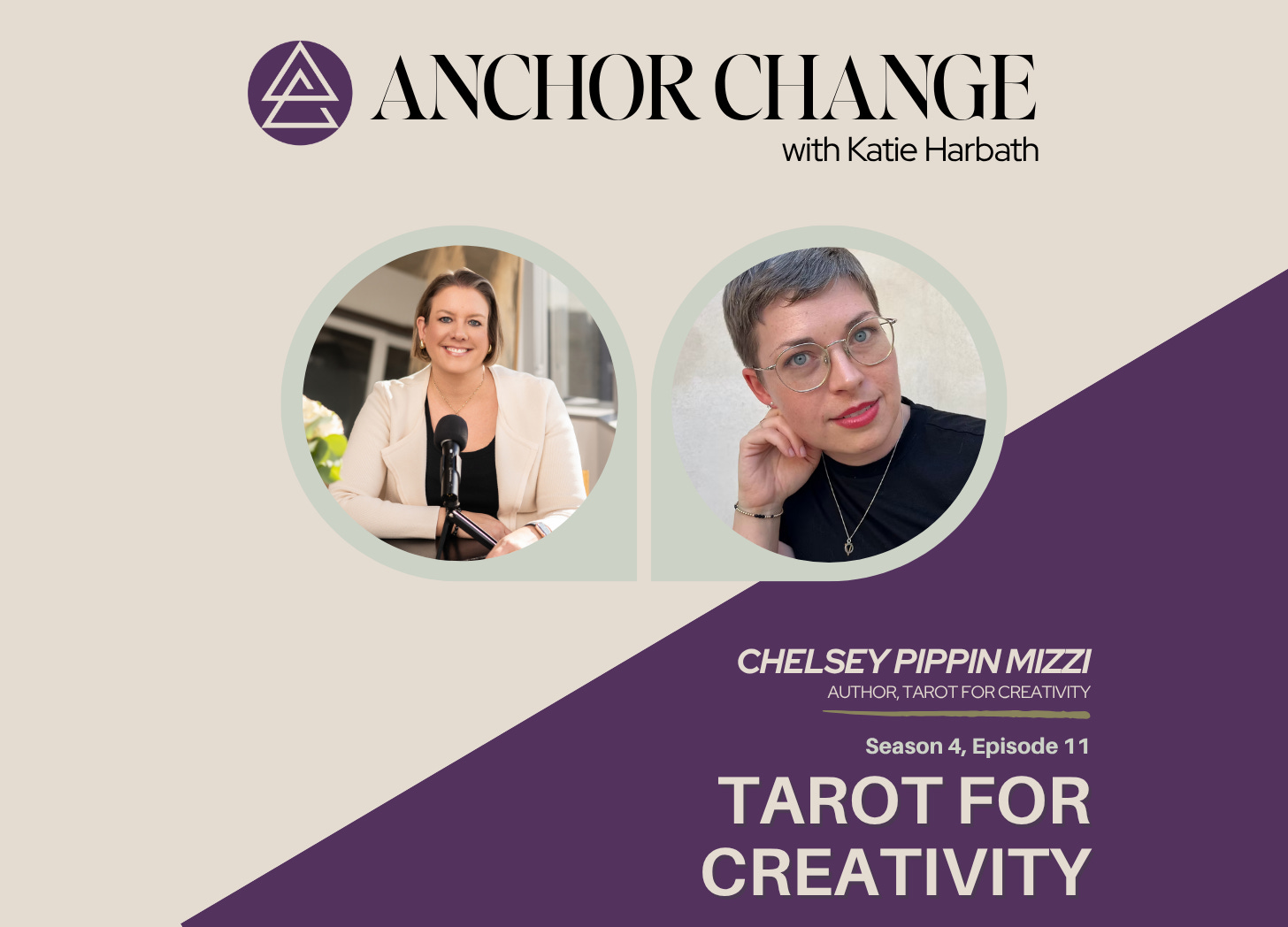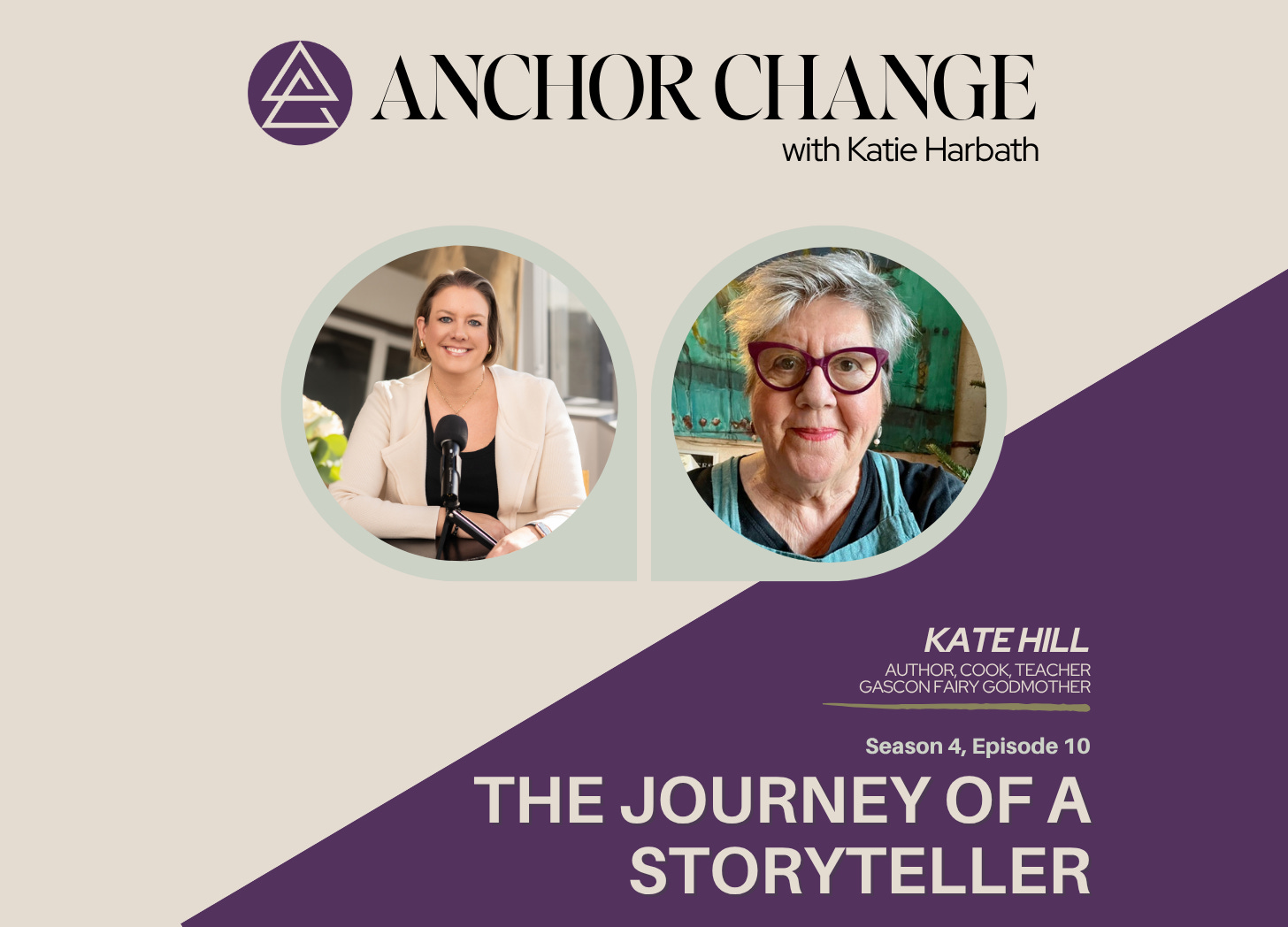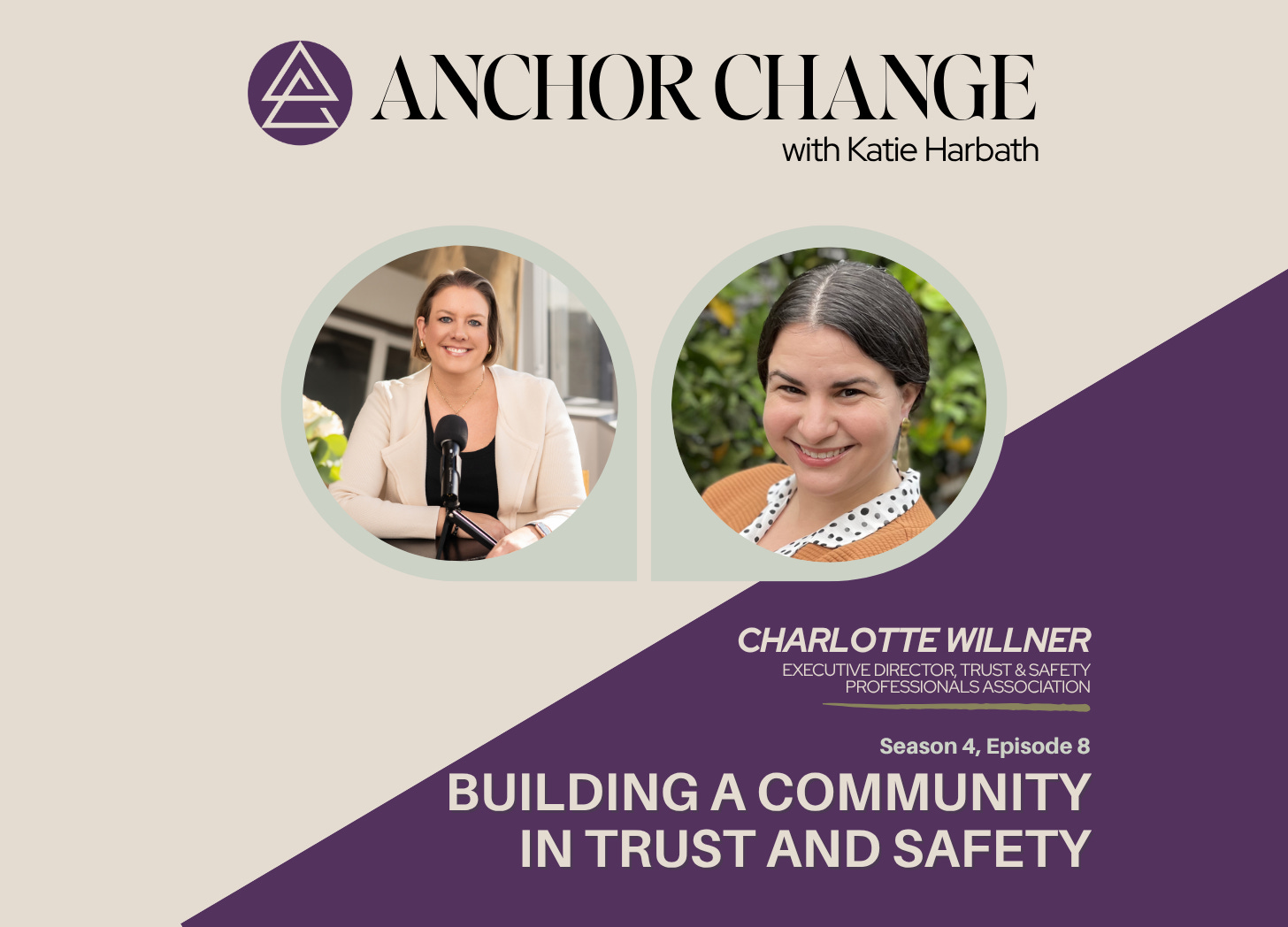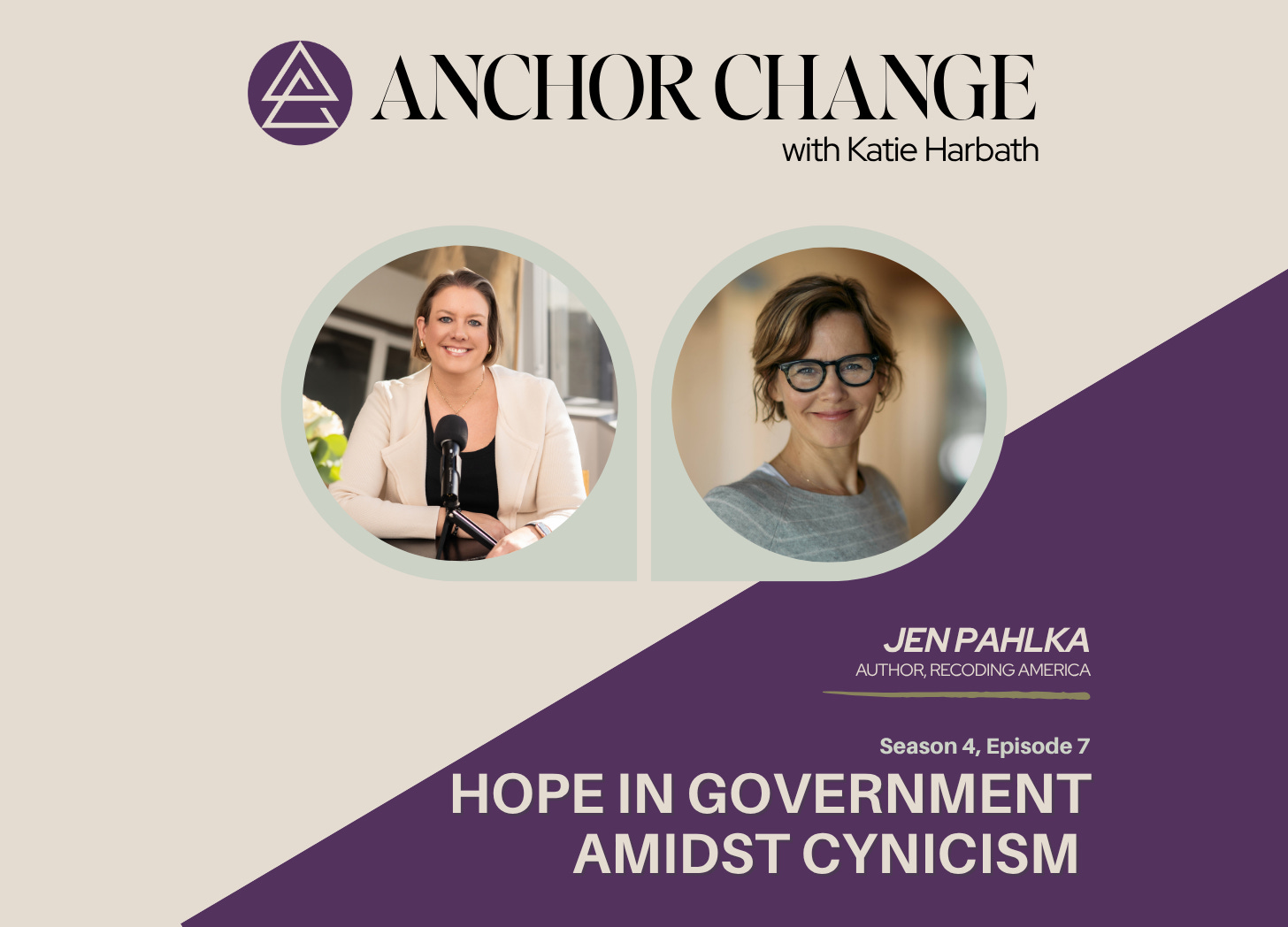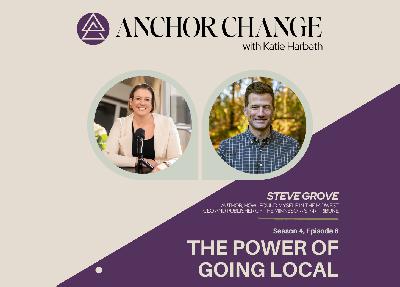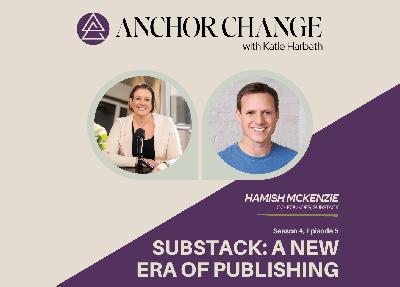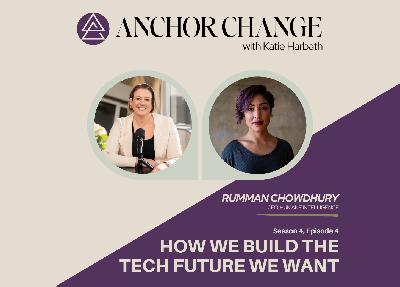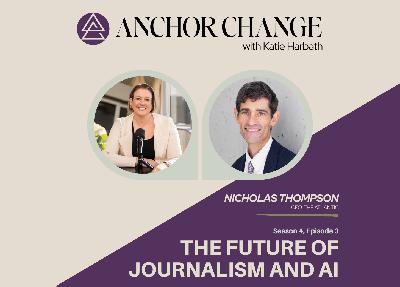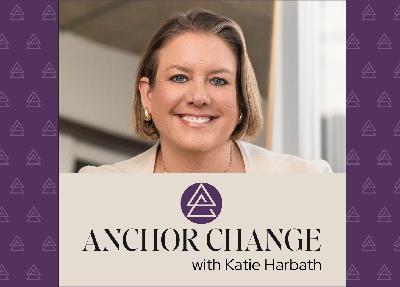Discover Anchor Change with Katie Harbath
Anchor Change with Katie Harbath

Anchor Change with Katie Harbath
Author: Katie Harbath
Subscribed: 3Played: 35Subscribe
Share
© Katie Harbath
Description
Welcome to Anchor Change, where we help you panic responsibly in a chaotic world. I’m Katie Harbath—a Midwesterner living in DC who’s spent two decades navigating impossible tradeoffs at the intersection of tech, politics, and democracy.
Each week, I’ll break down the headlines, talk with people forging bold paths, and explore how we can face disruption with clarity and courage. This isn’t about hot takes—it’s about finding steady ground when everything feels uncertain.
In a world of complexity, you don’t have to navigate it alone.
anchorchange.substack.com
Each week, I’ll break down the headlines, talk with people forging bold paths, and explore how we can face disruption with clarity and courage. This isn’t about hot takes—it’s about finding steady ground when everything feels uncertain.
In a world of complexity, you don’t have to navigate it alone.
anchorchange.substack.com
76 Episodes
Reverse
In this episode, Katie Harbath sits down with Michelle O’Grady of Team Friday to unpack how culture, identity, and technology are transforming the way brands and civic leaders connect with younger generations. They explore the rise of mixed-race identities, the fluid ways Gen Z and Gen Alpha see themselves, and what this means for marketers who want to stay relevant. Michelle shares how her work at the intersection of academia and brand strategy helps companies understand shifting consumer behavior—and why long-term thinking matters more than ever. The conversation also reflects on how politics and pop culture are colliding, and what authenticity really looks like when engaging the next generation.Takeaways* Understanding generational change is essential for modern marketing* Mixed-race identities are rapidly reshaping the demographic landscape* Brands must break out of siloed thinking to stay relevant* Gen Alpha’s worldview will drive the next wave of consumer expectations* Civic engagement is shifting alongside cultural and identity trends* Younger audiences expect authenticity from political and cultural leaders* Cultural fluidity demands nuanced, adaptive marketing strategies* Long-term, relationship-driven approaches outperform quick fixes* Effective engagement starts with meeting people where they already are* Complex, multifaceted identities require more sophisticated brand storytellingChapters* 00:00 Journey from Academia to Marketing* 04:45 Understanding Mixed Race Identity* 07:48 Merging Academic Insights with Brand Strategy* 12:38 The Rise of Gen Alpha* 16:40 Civic Participation and Political Engagement* 20:05 Changing Dynamics of Civic Participation* 23:50 Engaging the Younger Generation in Politics* 29:40 The Courage to Start a Business* 31:38 Complexity in Consumer Behavior* 38:24 Understanding Demographic Shifts* 40:49 Authenticity in Connection Points* 43:32 The Importance of Listening in Communication* 44:00 Long-Term Planning in Marketing and CommunicationAnchor Change with Katie Harbath is a reader-supported publication. To receive new posts and support my work, consider becoming a free or paid subscriber. This is a public episode. If you'd like to discuss this with other subscribers or get access to bonus episodes, visit anchorchange.substack.com/subscribe
In this episode, Katie Harbath sits down with Sarah Hunt, President of the Rainey Center, for a wide-ranging conversation about the energy system powering the AI era. They dig into why AI’s rapidly growing electricity needs are now a national security issue, how state legislators are shaping the future of infrastructure, and what the U.S. must do to stay competitive as countries like China scale their energy capacity at unprecedented speed.Together, they map out the real bottlenecks—permitting, grid modernization, workforce shortages—and the partnerships needed across government, industry, and communities to build an energy foundation strong enough to support innovation. This is a conversation about power, in every sense of the word, and why the choices we make now will determine what’s possible in the decades ahead.Takeaways * AI’s rising energy demand is becoming a central issue for innovation and national security.* State legislators are key players in energy affordability, siting, and infrastructure decisions.* Permitting and regulatory hurdles are slowing critical energy and grid projects.* China is expanding energy infrastructure faster than the U.S., raising competitiveness concerns.* Cross-sector collaboration is essential to meet future energy and AI needs.* Public-private partnerships can accelerate innovation and modernize the grid.* Community engagement is crucial for siting and sustaining energy projects.* A skilled workforce—especially electricians and grid technicians—is urgently needed.* The future of AI is directly tied to how the U.S. invests in energy infrastructure and national values.Chapters* 00:00 Introduction and Personal Connection* 03:32 The Rainy Center’s Mission and Focus Areas* 06:15 Understanding Energy Demands in AI* 08:50 Explaining Energy Strains to the General Public* 13:03 State-Level Energy Policy and Legislative Focus* 16:19 Federal Conversations and Policy Overlap* 18:39 Global Energy Race: U.S. vs. China* 25:52 The Future of AI and Energy Infrastructure* 29:17 Partnerships and Collaborations for Progress* 32:42 Convergence of Issues in Technology and Economy* 33:08 Innovative Uses of Technology in MiningAnchor Change with Katie Harbath is a reader-supported publication. To receive new posts and support my work, consider becoming a free or paid subscriber. This is a public episode. If you'd like to discuss this with other subscribers or get access to bonus episodes, visit anchorchange.substack.com/subscribe
Join us for a critical conversation at the intersection of ethics, journalism, and technology as we explore how the digital age is challenging foundational values.This episode features leading experts: Katy Culver (UW-Madison, School of Journalism and Mass Communication) and Rob Reich (Stanford University, Political Science & Center for Ethics in Society).The worlds of reporting and technology are colliding, forcing us to confront philosophical questions and reassess the values we should prioritize. We dive deep into:* The Ethics of AI and Algorithms: How do new technologies impact truth, transparency, and accountability in news?* Evolving Ethical Standards: Balancing personal morality with professional ethical frameworks in media and tech.* The Role of Education: Preparing future journalists and technologists to navigate complex ethical landscapes.* Community Engagement: How journalism can rebuild trust and drive positive, human-centric change.If you are interested in the future of media, digital ethics, AI bias, and the philosophical challenges of technology, this discussion is essential viewing/listening.Takeaways* The concept of ethics is complex and involves trade-offs.* Ethics in journalism must adapt to the changing media landscape.* AI presents new challenges for ethical decision-making.* Students must be trained for jobs that do not yet exist.* The Omelas dilemma illustrates the struggle between rights and responsibilities.* Tech companies have a moral obligation to consider their impact.* Young journalists are questioning traditional notions of neutrality.* Community engagement is essential for local journalism.* Innovative business models are emerging in response to industry challenges.* There is hope in the creativity and engagement of younger generations.Chapters* 00:00 Introduction to Ethics in Journalism and Tech* 04:48 The Role of Journalism Ethics in Modern Media* 07:42 Tech Ethics: Bridging Philosophy and Practice* 10:15 The Omelas Dilemma: Ethical Choices in Tech* 13:01 Evolving Perspectives on Ethics in Tech and Journalism* 15:38 The Intersection of Journalism and Technology* 18:20 Navigating Personal and Professional Ethics* 20:51 The Future of Ethics in Journalism and Tech* 25:34 The Evolution of Journalism and Ethics* 28:08 The Impact of Algorithms on Media* 33:07 Philosophical Perspectives on Media Responsibility* 37:18 Business Models and the Future of Journalism* 44:15 Hope and Innovation in Journalism* 49:40 Navigating Ethical Dilemmas in Information Consumption* 50:08 The Complexity of Accountability in Content Creation This is a public episode. If you'd like to discuss this with other subscribers or get access to bonus episodes, visit anchorchange.substack.com/subscribe
In this episode, Jeff Berkowitz shares his journey from politics to founding Delve, a consultancy that leverages AI to transform public affairs. He discusses the challenges and opportunities of integrating AI into public affairs, the development of Delve’s AI platform, and insights into the future of AI technology in the industry.Some of the topics we talk about include:* Jeff’s transition from politics to AI consultancy.* The role of AI in simplifying public affairs tasks.* Delve’s development of a full-stack public affairs intelligence platform.* The importance of strategic intelligence in public affairs.* Challenges of integrating AI into public affairs.* Insights into the future of AI technology in public affairs.* The impact of AI on time management and efficiency.* The significance of real-time transcription in public affairs.* The evolution of public affairs with AI technology.* The importance of understanding both technology and public affairs.Learn more about Delve at https://www.delvedeeper.ai This is a public episode. If you'd like to discuss this with other subscribers or get access to bonus episodes, visit anchorchange.substack.com/subscribe
In this episode, I interview Bill Skelly about the intersection of AI, data, and the entertainment industry, specifically Hollywood. We discuss the evolution of data usage from politics to entertainment, the role of AI in democratizing data, and the challenges and opportunities in the entertainment industry. Skelly shares insights on how data-driven strategies are transforming film marketing and the importance of proactive policy discussions around AI.Takeaways* AI is still a novelty for many, but it holds potential to democratize data.* Data-driven strategies are transforming film marketing in Hollywood.* The entertainment industry is looking for new approaches to reach audiences.* AI can help strategists interact more closely with data.* The quantity of data has grown, but finding the right data is key.* AI is an augmenter, not a replacement for human roles.* Hollywood is open to new data-driven approaches from political backgrounds.* The long tail of content consumption is expanding with more niche audiences.* Proactive policy discussions are needed to define AI’s role in industries.* AI’s impact on the entertainment industry is still unfolding.Chapters* 00:00:00 Introduction and Background* 00:00:00 The Evolution of Data in Politics* 00:00:00 AI’s Role in Democratizing Data* 00:00:00 Data-Driven Strategies in Hollywood* 00:00:01 Challenges and Opportunities in Entertainment* 00:00:01 Proactive Policy Discussions on AIAnchor Change with Katie Harbath is a reader-supported publication. To receive new posts and support my work, consider becoming a free or paid subscriber. This is a public episode. If you'd like to discuss this with other subscribers or get access to bonus episodes, visit anchorchange.substack.com/subscribe
In this episode of Anchor Change, I talk with Daphne Keller, Director of Platform Regulation at Stanford and former Google attorney, about how laws shape what we can say—and see—online.We unpack how evolving regulations influence content moderation, the growing role of AI in shaping speech policies, and the challenges of balancing free expression with safety in a global context. Daphne shares what she’s learned from years at the front lines of platform policy, clarifying common misconceptions and revealing where law, technology, and ethics collide.This conversation offers a grounded look at the future of online speech—from transparency rules to child safety laws—and how tech companies can navigate these tensions with integrity.You can find more about Daphne’s work here. Her piece in Lawfare, which we discussed, is titled “The Rise of the Compliant Speech Platform.”Anchor Change with Katie Harbath is a reader-supported publication. To receive new posts and support my work, consider becoming a free or paid subscriber. This is a public episode. If you'd like to discuss this with other subscribers or get access to bonus episodes, visit anchorchange.substack.com/subscribe
Welcome to Season 5 of the Anchor Change podcast! For the next few months, I’m excited to engage in conversations about Gen Z, artificial intelligence, and, of course, politics. For my first episode, I’m talking to Cory Ondrejka, the chief technology officer of SmartNews, where we explore the intersections of technology, creativity, and community. We also reflect on our shared experiences in Madison, Wisconsin.We cover Cory’s early career in tech, including his time at Second Life and Facebook, and the lessons learned about product development and user engagement. The conversation shifts to the challenges of news consumption in a polarized environment, introducing NewsArc as a solution aimed at improving how people access and engage with news. We delve into the complexities of political bias in journalism and the growing trend of news avoidance, emphasizing the need for intentionality in news consumption. Looking ahead, Cory shares his vision for the future of news and technology, advocating for a respectful and engaging news ecosystem.Here’s what we cover:* Roots in Madison: A Journey Through Time* Navigating the Digital Landscape: Early Career Insights* Reflections on Facebook: Lessons from the Past* Innovating News Consumption: The Birth of NewsArc* Addressing Political Bias in News* Understanding News Avoidance: Trends and Insights* Looking Ahead: The Future of News and TechnologyHope you enjoy!Download the NewsArc app here.Anchor Change with Katie Harbath is a reader-supported publication. To receive new posts and support my work, consider becoming a free or paid subscriber. This is a public episode. If you'd like to discuss this with other subscribers or get access to bonus episodes, visit anchorchange.substack.com/subscribe
What if tarot wasn’t about predicting the future—but about helping you tell your story?In this week’s episode, I’m joined by writer, tarot coach, and Substack author Chelsey Pippin Mizzi for a conversation that bridges the spiritual and the practical, the mystical and the creative. Chelsey’s approach to tarot isn’t about fortune-telling—it’s about reflection, imagination, and accessing the parts of ourselves we’ve forgotten how to listen to.We talk about:* Why tarot is a tool for creative storytelling—not a test you can fail* How she combined her background in writing, theater, and editing into a tarot coaching business* The myths (and anxieties) that keep people from connecting with their intuition* What it means to “shadow play” and how we can write from our darker, unclaimed selves* How Chelsey’s Substack and books (Tarot for Creativity and The Shadow Path) are changing the way writers engage with their inner worldPlus, she pulls a tarot card for the episode and shares what’s exciting her most right now.Whether you’re tarot-curious or creatively stuck, this one’s full of permission, play, and practical magic.🃏 Mentioned in this episode:* Tarot for Creativity * The Shadow Path* Tarot Spreads Yearbook* Chelsey’s newsletter and journaling club: The Shuffle on SubstackAnchor Change with Katie Harbath is a reader-supported publication. To receive new posts and support my work, consider becoming a free or paid subscriber. This is a public episode. If you'd like to discuss this with other subscribers or get access to bonus episodes, visit anchorchange.substack.com/subscribe
How do you build a life that unfolds like a story worth telling?This week, I sit down with the inimitable Kate Hill—writer, cook, mentor, and founder of the creative retreat Camont in Southwest France. Kate has lived many lives: as an art curator, barge navigator, cookbook author, and now as a Substack writer sharing deeply personal reflections on food, place, and creative practice.In this episode, we talk about:* The thread of storytelling through every chapter of Kate’s career—from puppeteering to cookbooks* How she knows when it’s time to pivot and the inner signals that guide her* What makes a place feel magical—and how she intentionally designed Camont to nurture quiet creativity* The ritual (and snobbery) of the French farmers market and why it’s more than just food* Why she chose to serialize her memoir on Substack and how she thinks about paid vs. free content* Advice for people in midlife and beyond who are yearning to take a leap but don’t know howThis one’s for anyone wondering if it’s too late to start something new. (Spoiler: it’s not.)📰 Read a bit about Kate and her summer pie recipe in the New York Times earlier this month.🇫🇷 Here’s my recap of the two week’s I spent at Camont: My French Writing Adventure🌿 Learn more about Kate’s work and retreats at https://relaisdecamont.com/📝 Read her writing: Anchor Change with Katie Harbath is a reader-supported publication. To receive new posts and support my work, consider becoming a free or paid subscriber. This is a public episode. If you'd like to discuss this with other subscribers or get access to bonus episodes, visit anchorchange.substack.com/subscribe
What if your business could be both wildly successful and soulfully aligned? In this episode, I talk with Rachael James, the founder of Wild Alabaster and Urban Alchemy Coffee Co., about building brands that are both beautiful and healing, crafting a life that fits your actual needs, and how to panic responsibly when the momentum takes off faster than you planned.We talk about:* How she accidentally became a crystal dealer and made $10k in a weekend* Her philosophy of therapeutic retail and what makes an experience sacred* Why she believes in magic, science, and the power of aesthetic healing* How she navigates burnout, motherhood, and scaling without losing herself* The power of branding, pacing, and staying rooted in your “why”Whether you’re building a business, a portfolio life, or just figuring out your next chapter—this episode is a warm, grounded reminder that you don’t have to do it all at once. The thing meant for you will show up.🛍 Use code ANCHOR20 for 20% off at wildalabaster.com This is a public episode. If you'd like to discuss this with other subscribers or get access to bonus episodes, visit anchorchange.substack.com/subscribe
Trust and safety is often misunderstood—seen as reactive, political, or merely procedural. But for those doing the work, it’s something much deeper: a profession built on care, resilience, and community.Charlotte Willner, Executive Director of the Trust and Safety Professional Association (TSPA), joins Katie to share how she got into the field, what it was like writing the first rules of the internet at Facebook, and why building professional support networks is critical to the field’s future.This episode goes beyond tech policy headlines to explore:* The early days of trust and safety before it had a name* Career pivots, burnout, and when it’s time to leave* How AI is changing the work—not replacing it* Why community is essential for people doing invisible labor* The deeper gender and cultural dynamics in caregiving roles like trust and safetyWhether you’re in the field or just trying to understand it better, this episode sheds light on the people and values holding up the internet behind the scenes.Anchor Change with Katie Harbath is a reader-supported publication. To receive new posts and support my work, consider becoming a free or paid subscriber. This is a public episode. If you'd like to discuss this with other subscribers or get access to bonus episodes, visit anchorchange.substack.com/subscribe
When headlines fuel distrust in government and disruption feels more chaotic than constructive, how do we hold onto hope—and channel it into real reform?This week on Anchor Change, I talk with Jen Pahlka—founder of Code for America, author of Recoding America, and former U.S. Deputy CTO—about what it means to not just criticize the system, but to fix it. We dive into:* Why public servants feel both unseen and indispensable—and how her truth-telling book changed that* How AI could help cut through procedural bloat and modernize government services* What too many reformers get wrong about "disruption"* The real story behind the U.S. Digital Service and what it taught her about policy vs. implementation* Her hopeful message for those disillusioned by recent political changesFrom the importance of how things get done to the promise (and risk) of AI in the public sector, this conversation is a reminder that real change takes time, courage—and clarity.📘 Grab Jen’s book Recoding America if you haven’t already.Anchor Change with Katie Harbath is a reader-supported publication. To receive new posts and support my work, consider becoming a free or paid subscriber. This is a public episode. If you'd like to discuss this with other subscribers or get access to bonus episodes, visit anchorchange.substack.com/subscribe
Steve Grove has had a front-row seat to the evolution of the internet, from his early days at YouTube shaping the political division to navigating crisis in state government, and now—reinventing local journalism as publisher of the Star Tribune.In this episode, I talk with Steve to talk about the through lines in his career, what led him to leave Silicon Valley for his home state of Minnesota, and why going local may be the most overlooked solution to our national dysfunction. We unpack the early optimism of platforms in politics, the challenges of shifting between tech, government, and media, and what it really takes to rebuild trust—community by community.Whether you're considering a big life pivot or trying to find purpose in a broken system, Steve’s story is a reminder that reinvention isn’t a detour—it’s the path.🔑 Key Topics:* The early days of YouTube politics and platform optimism* Leaving Big Tech for state government—and what he learned* The culture shock (and opportunity) of working in government* Rebuilding trust through local journalism* The underestimated power of community and place-based identity* Advice for anyone considering a career pivot* Why reinvention is a superpower📌 Mentioned:* Steve’s new book: How I Found Myself in the Midwest: A Memoir of Reinvention* The Minnesota Star Tribune: www.startribune.com* Steve’s website and book tour: www.stevegrove.com💬 Favorite Quote:“When you go local, you don’t have time for polarization—you’re too busy solving problems.” —Steve Grove📣 Subscribe + ShareLove this episode? Don’t forget to rate and review Anchor Change and subscribe on your favorite podcast platform. And if it resonated with you, share it with someone else navigating their own reinvention.Anchor Change with Katie Harbath is a reader-supported publication. To receive new posts and support my work, consider becoming a free or paid subscriber. This is a public episode. If you'd like to discuss this with other subscribers or get access to bonus episodes, visit anchorchange.substack.com/subscribe
In this conversation, Katie Harbath speaks with Hamish McKenzie, co-founder of Substack, about the transformative role of the platform in the media landscape. They discuss how Substack is redefining trust in journalism, the impact of AI on content creation, and the importance of direct relationships between creators and their audiences. McKenzie shares insights on the evolution of media from centralized control to a more democratic model, the challenges of navigating political discourse, and the future of journalism in an increasingly complex digital world.Topics covered include: * The Media Disruption Landscape* Phases of Media Evolution* Substack's Growth and Community Building* Political Discourse and Responsibility* Navigating Risks in Political Engagement* Content Moderation and Free Speech* Fostering Diverse Dialogue* Scaling Challenges for Substack* Navigating PR Challenges in Tech Companies* The Role of AI in Publishing* AI as a Tool for Creators* Balancing Content Formats for Audience Engagement* Subscription Models and Reader Fatigue* The Journey from Journalism to Entrepreneurship* Future Vision for Substack and Media Culture* Reimagining Trust in Publishing* Navigating AI and CreativityYou can follow Hamish on his Substack Disjointed and you can listen to his recent TED talk here.Anchor Change with Katie Harbath is a reader-supported publication. To receive new posts and support my work, consider becoming a free or paid subscriber. This is a public episode. If you'd like to discuss this with other subscribers or get access to bonus episodes, visit anchorchange.substack.com/subscribe
This week’s episode is for anyone who’s ever felt overwhelmed by the pace of AI—or unsure of what power they really hold to shape the future.Rumman Chowdhury is a trailblazer in the responsible AI space—she’s worked in big tech, launched her own nonprofit, advised the Biden administration, and now runs Humane Intelligence. What makes her stand out isn’t just her résumé—it’s her refusal to settle for cynicism.She calls herself an AI optimist. And not in a naive way. She knows the risks, she’s lived them—but she still believes that we have agency. That our choices—what tools we use, what questions we ask, what we say no to—actually matter. And that optimism, in this moment, is a radical act.We talk about how to embrace failure, how to test and red-team the technologies shaping our world, and why the right to repair isn't just about tractors—it’s about power, access, and dignity in the digital age.Anchor Change with Katie Harbath is a reader-supported publication. To receive new posts and support my work, consider becoming a free or paid subscriber. This is a public episode. If you'd like to discuss this with other subscribers or get access to bonus episodes, visit anchorchange.substack.com/subscribe
In this episode, I sit down with Nicholas Thompson, CEO of The Atlantic, for a candid conversation about leading through disruption. From implementing a tighter paywall strategy that turned the publication profitable, to navigating career pivots from editor to executive, Nick shares the lessons he’s learned in data-driven leadership and reinvention.We dig into the evolving identity of journalists in the Substack era, the ethics of using AI in reporting, and how media companies can remain trusted institutions in a time of fragmentation. Plus, Nick reflects on why resting after a marathon—and in life—is harder than it sounds.If you're a journalist, entrepreneur, or just trying to make sense of a changing information landscape, this episode will give you clarity, grounded insights, and a little inspiration.📌 Topics include:* Why The Atlantic tightened its paywall—and what happened next* How Nick uses LinkedIn videos for strategy and brand visibility* The pros and cons of journalists going solo* The Atlantic’s approach to AI use and partnerships* Strategic advice for the next generation of journalists* The future of trustworthy media in divided America📍 Follow Nicholas Thompson on LinkedIn and check out his podcast, The Most Interesting Thing in AI.Anchor Change with Katie Harbath is a reader-supported publication. To receive new posts and support my work, consider becoming a free or paid subscriber. This is a public episode. If you'd like to discuss this with other subscribers or get access to bonus episodes, visit anchorchange.substack.com/subscribe
When Suzy Dean left teaching, she wasn’t just making a career pivot—she was reclaiming her peace. In this episode, I talk to Suzy—also known as @woowoobestie_suzy—about the path from high school English teacher to intuitive entrepreneur and creator of her own unique digital brand.We talk about what it means to show up online with honesty, how to take care of your nervous system while building a business, and why your next big move might be less about hustle and more about alignment.Whether you’re growing a brand, raising a family, or just trying to find a minute to rest—this conversation is full of grounded wisdom, belly laughs, and unexpected reminders to make life more magical.Topics we cover:* Walking away from a job that no longer fits* How Suzy manifested her “bridge job”* Turning essential oils and woowoo magic into a thriving business* Creating boundaries and rituals in public-facing work* Rest, rhythm, and running an online shop with soul👀 Check out Suzy’s work at yourwoowoobestie.com📸 Follow her on Instagram: @woowoobestie_suzy This is a public episode. If you'd like to discuss this with other subscribers or get access to bonus episodes, visit anchorchange.substack.com/subscribe
This is a public episode. If you'd like to discuss this with other subscribers or get access to bonus episodes, visit anchorchange.substack.com/subscribe
I’m excited to announce that the podcast returns Thursday, May 29, with a fresh season of conversations designed to help you navigate life's complexities—and panic responsibly. As part of streamlining my brand, the podcast has officially transitioned from Impossible Tradeoffs to Anchor Change. This season, you'll hear stories of courageous pivots, meaningful transformations, and actionable insights from thought leaders including: * Christina Wallace, author of The Portfolio Life* Nick Thompson, CEO of The Atlantic* Rumman Chowdhury of Humane Intelligence* Hamish McKenzie from SubstackAnd many more!This podcast is going to be available in video and audio formats! Please subscribe and follow on YouTube and your favorite podcast provider to ensure you don't miss a single episode!Anchor Change with Katie Harbath is a reader-supported publication. To receive new posts and support my work, consider becoming a free or paid subscriber. This is a public episode. If you'd like to discuss this with other subscribers or get access to bonus episodes, visit anchorchange.substack.com/subscribe
For my last podcast of season three and 2024, I’m thrilled to welcome Ravi Agrawal, the Editor-in-Chief of Foreign Policy magazine, to reflect on this historic year of elections.We discussed the significant trends and observations from the 2024 elections globally during our conversation. He highlights the challenges incumbents faced, the role of cybersecurity and AI in elections, and the geopolitical implications of these electoral outcomes. The discussion also delves into the future of Indian politics, the impact of technology on global relations, and the evolving media landscape.Thank you all for listening this season. I’ll be back in 2025! I’ve got many things planned, including turning this into a video podcast, so stay tuned. Anchor Change with Katie Harbath is a reader-supported publication. To receive new posts and support my work, consider becoming a free or paid subscriber. This is a public episode. If you'd like to discuss this with other subscribers or get access to bonus episodes, visit anchorchange.substack.com/subscribe



